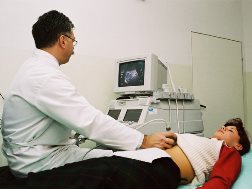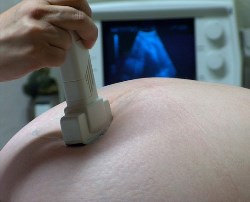How to Select the Right Ultrasound Technician Degree Program near Junction Texas
 Once you have decided to obtain an ultrasound technician degree near Junction TX, it’s time to start the process of picking a college. First, you have to find the ideal program that will furnish the proper training to become a qualified professional. And because some states do mandate that sonographers be either certified or licensed, depending on your residence you may also need preparation to pass a licensing or certification exam. So it’s extremely important that you research each college so that you can assess and compare your options. But exactly where does one begin? Most potential students will start by looking for colleges that are within travelling distance of their residences and then by comparing tuition. Certainly location and cost must be taken into account when making a decision, but there are other important factors as well. For example, if the ultrasound technician schools are accredited or if they offer internship programs. These and other qualifications will be covered more in depth later in this post. But to start with, let’s go over what an ultrasound tech does and the degrees and online education programs that are offered.
Once you have decided to obtain an ultrasound technician degree near Junction TX, it’s time to start the process of picking a college. First, you have to find the ideal program that will furnish the proper training to become a qualified professional. And because some states do mandate that sonographers be either certified or licensed, depending on your residence you may also need preparation to pass a licensing or certification exam. So it’s extremely important that you research each college so that you can assess and compare your options. But exactly where does one begin? Most potential students will start by looking for colleges that are within travelling distance of their residences and then by comparing tuition. Certainly location and cost must be taken into account when making a decision, but there are other important factors as well. For example, if the ultrasound technician schools are accredited or if they offer internship programs. These and other qualifications will be covered more in depth later in this post. But to start with, let’s go over what an ultrasound tech does and the degrees and online education programs that are offered.
Ultrasound Technician Work Summary
 There are various professional titles for ultrasound techs (technicians). They are also referred to as ultrasound technologists, sonogram techs, and diagnostic medical sonographers (or just sonographers). No matter what their title is, they all have the same primary job function, which is to implement diagnostic ultrasound procedures on patients. Even though many practice as generalists there are specialties within the field, for example in cardiology and pediatrics. The majority work in Junction TX hospitals, clinics, outpatient diagnostic imaging centers and even private practices. Routine daily job tasks of a sonogram technician can involve:
There are various professional titles for ultrasound techs (technicians). They are also referred to as ultrasound technologists, sonogram techs, and diagnostic medical sonographers (or just sonographers). No matter what their title is, they all have the same primary job function, which is to implement diagnostic ultrasound procedures on patients. Even though many practice as generalists there are specialties within the field, for example in cardiology and pediatrics. The majority work in Junction TX hospitals, clinics, outpatient diagnostic imaging centers and even private practices. Routine daily job tasks of a sonogram technician can involve:
- Keeping records of patient case histories and specifics of each procedure
- Counseling patients by explaining the procedures and answering questions
- Preparing the ultrasound machines for testing and then sterilizing and recalibrating them
- Transferring patients to treatment rooms and ensuring their comfort
- Using equipment while limiting patient exposure to sound waves
- Reviewing the results and identifying necessity for supplemental testing
Sonographers must frequently assess the performance and safety of their equipment. They also must adhere to a high professional standard and code of conduct as health practitioners. In order to sustain that degree of professionalism and remain up to date with medical knowledge, they are required to enroll in continuing education courses on an ongoing basis.
Sonogram Tech Degree Programs Available
 Sonogram tech enrollees have the option to acquire either an Associate or a Bachelor’s Degree. An Associate Degree will usually require around 18 months to 2 years to accomplish based upon the program and class load. A Bachelor’s Degree will take longer at up to four years to complete. Another option for those who have previously earned a college degree is a post graduate certificate program. If you have earned a Bachelor’s Degree in any major or an Associate Degree in a relevant health sector, you can enroll in a certificate program that will require only 12 to 18 months to finish. Something to bear in mind is that most ultrasound technician colleges do have a practical training component as a portion of their curriculum. It can often be satisfied by taking part in an internship program which numerous colleges set up through Junction TX hospitals and clinics. After you have graduated from one of the certificate or degree programs, you will then have to fulfill the certification or licensing requirements in Texas or whichever state you elect to practice in.
Sonogram tech enrollees have the option to acquire either an Associate or a Bachelor’s Degree. An Associate Degree will usually require around 18 months to 2 years to accomplish based upon the program and class load. A Bachelor’s Degree will take longer at up to four years to complete. Another option for those who have previously earned a college degree is a post graduate certificate program. If you have earned a Bachelor’s Degree in any major or an Associate Degree in a relevant health sector, you can enroll in a certificate program that will require only 12 to 18 months to finish. Something to bear in mind is that most ultrasound technician colleges do have a practical training component as a portion of their curriculum. It can often be satisfied by taking part in an internship program which numerous colleges set up through Junction TX hospitals and clinics. After you have graduated from one of the certificate or degree programs, you will then have to fulfill the certification or licensing requirements in Texas or whichever state you elect to practice in.
Online Ultrasound Tech Schools
 As earlier discussed, nearly all sonogram tech schools have a practical component to their programs. So while you can obtain a degree or certificate online, a significant portion of the training will be either carried out in an on campus laboratory or at an approved off campus medical care provider. Clinical training can often be fulfilled through an internship at a local Junction TX hospital, outpatient clinic or private practice. But the balance of the training and classes may be accessed online in your Junction home. This is particularly beneficial for those students that continue working while obtaining their degrees. Plus online programs are often less costly than traditional options. Expenditures for study materials and commuting may be decreased as well. But similarly as with any sonographer school you are looking at, check that the online school you choose is accredited. One of the most highly respected accrediting agencies is the Commission on Accreditation of Allied Health Education Programs (CAAHEP). Accreditation is especially crucial for licensing, certification and finding employment (more on accreditation later). So if you are disciplined enough to learn away from the classroom in the comfort of your own home, then an online school may be the ideal choice for you.
As earlier discussed, nearly all sonogram tech schools have a practical component to their programs. So while you can obtain a degree or certificate online, a significant portion of the training will be either carried out in an on campus laboratory or at an approved off campus medical care provider. Clinical training can often be fulfilled through an internship at a local Junction TX hospital, outpatient clinic or private practice. But the balance of the training and classes may be accessed online in your Junction home. This is particularly beneficial for those students that continue working while obtaining their degrees. Plus online programs are often less costly than traditional options. Expenditures for study materials and commuting may be decreased as well. But similarly as with any sonographer school you are looking at, check that the online school you choose is accredited. One of the most highly respected accrediting agencies is the Commission on Accreditation of Allied Health Education Programs (CAAHEP). Accreditation is especially crucial for licensing, certification and finding employment (more on accreditation later). So if you are disciplined enough to learn away from the classroom in the comfort of your own home, then an online school may be the ideal choice for you.
Questions to Ask Sonography Programs
 When you have determined the type of degree or certificate that you would like to obtain, you can begin the process of assessing and comparing sonogram tech colleges. You will first probably want to choose whether you would rather access classes online or commute to a college campus in the Junction TX area. Clearly location will be significant if you choose the latter, and the price of tuition no doubt will be an important qualification also. But there are additional variables that you must also take into account, for example if the programs are accredited and if they offer internships. Therefore in order to complete your due diligence so that you can make your final selection, following are a few questions that you may want to ask each sonographer school before deciding.
When you have determined the type of degree or certificate that you would like to obtain, you can begin the process of assessing and comparing sonogram tech colleges. You will first probably want to choose whether you would rather access classes online or commute to a college campus in the Junction TX area. Clearly location will be significant if you choose the latter, and the price of tuition no doubt will be an important qualification also. But there are additional variables that you must also take into account, for example if the programs are accredited and if they offer internships. Therefore in order to complete your due diligence so that you can make your final selection, following are a few questions that you may want to ask each sonographer school before deciding.
Are the Sonogram Tech Colleges Accredited? The majority of sonogram technician colleges have acquired some form of accreditation, whether national or regional. However, it’s still crucial to confirm that the school and program are accredited. Among the most highly regarded accrediting organizations in the field of sonography is the Joint Review Committee on Education in Diagnostic Medical Sonography (JRC-DMS). Schools receiving accreditation from the JRC-DMS have undergone an extensive examination of their teachers and educational materials. If the program is online it might also receive accreditation from the Distance Education and Training Council, which focuses on online or distance education. All accrediting agencies should be acknowledged by the U.S. Department of Education or the Council on Higher Education Accreditation. Along with guaranteeing a superior education, accreditation will also assist in securing financial assistance and student loans, which are many times not offered for non-accredited schools. Accreditation may also be a pre-requisite for certification and licensing as required. And numerous Junction TX employers will only hire graduates of an accredited program for entry level positions.
Are Internship Programs Offered? Inquire if the sonogram tech colleges you are interested in have partnerships with Junction TX clinics or hospitals for internship programs. Internships are not only an excellent means to get hands on training in a clinical environment, they are also a means to fulfill the practical training requirement for the majority of programs. As a secondary benefit, they may help students and graduates establish professional relationships in the Junction medical community and assist with obtaining employment.
Is Job Placement Assistance offered? You will probably want to secure employment quickly after graduating, but finding that first job in a new profession can be difficult without support. Find out if the ultrasound tech programs you are assessing have job assistance programs and what their placement rates are. High and rapid placement rates are an excellent indication that the schools have large networks and great relationships with Texas healthcare employers. It also substantiates that their graduates are highly regarded and in demand.
Where is the School Located? For a number of students, the college they select will have to be within commuting distance of their Junction TX residence. Students who have decided to attend classes online naturally will not have to concern themselves with the location of the campus. However, the availability of local internships will be of importance. Something to consider is that if you decide to enroll in a college that is out of state or even out of your local area, you may have to pay a higher tuition. State colleges typically charge higher tuitions for out of state residents. And community colleges normally charge a higher tuition for those students that live outside of their districts.
What are the Class Sizes ? Unless you are the type of student that likes to sit far in the rear of the classroom or hide in the crowd, you will likely prefer a smaller class size. Small classes permit more individual participation and personalized instruction. Ask the colleges you are researching what the average student to teacher ratio is for their classrooms. If practical you may want to sit in on one or more classes before making your final determination. This will also give you an opportunity to converse with a few of the students and instructors to get their perspectives regarding the sonogram tech program as well.
Does the Program Accommodate your Schedule? And finally you need to confirm that the sonographer college you ultimately pick can provide the class schedule you need. This is especially crucial if you decide to continue working while attending classes. If you must schedule night or weekend classes in the Junction TX area, verify that they are offered. If you can only enroll on a part-time basis, check if that is an alternative and how many credit hours or courses you would need to carry. Also, ask what the protocol is for making up any classes that you might miss as a result of work, illness or family emergencies.
Enrolling in an Ultrasound Tech Program near Junction TX?
If you are considering a Sonography Tech School near Junction Texas, following is some interesting background information about the location of your new school campus.
Junction, Texas
Junction is located at 30°29′23″N 99°46′17″W / 30.489772°N 99.771335°W / 30.489772; -99.771335 (30.489772, -99.771335),[6] about 105 miles (169 km) northwest of San Antonio and 120 miles (190 km) west of Austin in central Kimble County.[2]
The community was founded in 1876 after the organization of Kimble County earlier that year.[7] The original town site was named Denman after Marcellus Denman, who had surveyed and platted the new community. The name Denman was quickly changed to Junction City. In late 1876, Junction City won the designation of county seat from the unsuccessful and flood-prone settlement of Kimbleville. By 1879, a drugstore, livery stable, sawmill, and a few general stores were active in the community. Around 300 people were living in Junction City in 1882. The West Texas, Kimble County's first newspaper, began publishing in 1882. The county courthouse and its records were lost to a fire in 1884. A second, two-story brick stone courthouse was partially destroyed in an 1888 fire, but was repaired and remained in use until 1929, when the present courthouse was constructed. In 1894, Junction City became known simply as Junction.[7] Infrastructure improvements marked the decade of the 1890s. Businessman Ernest Holekamp provided the city's first waterworks with a canal dug from the South Llano to Junction in 1895. A dam was built in 1896 on the South Llano River to provide power and water to the city and irrigation to surrounding lands.
The population stood at 536 in 1900. Four Mile Dam, a more permanent and extensive dam, was completed in 1904. Junction continued to rapidly grow, with around 800 residents living in the community in 1910. That figure had grown to 1,250 by 1920. By the late 1920s, citizens felt the need for the benefits of a municipal government.[8] On August 27, 1927, H.O. Denman and 152 others presented an incorporation petition to Kimble County Judge J.B. Randolph. In the election, 390 votes were cast: 274 (70%) "For Incorporation" and 116 (30%) "Against Incorporation." A city officers' election took place on October 13, 1927, with Ernest Holekamp elected as Junction's first mayor.[8] During the mid-1920s, highway connections from Junction to Menard and San Angelo were made available. A sewer system was built in 1929. In the 1930 census, the city recorded 1,415 residents. Junction was the chief shipping and commercial center of Kimble County, as well as a tourist resort and hunting center. A new municipal building and fire station were opened in 1939 and 1940, respectively. In the mid-1940s, the cedar-oil business enhanced the economy, but the city's growth slowed.[7] Throughout the latter half of the 20th century, Junction's population continued to hover around 2,600. A 2007 US Census Bureau estimate placed the population at 2,576, a 1.6% decline from the 2000 census figure of 2,618.[9]
As of the census[3] of 2000, 2,618 people, 1,028 households, and 699 families resided in the city. The population density was 1,145.0 people per square mile (441.4/km2). The 1,222 housing units averaged 534.5 per square mile (206.0/km2). The racial makeup of the city was 86.13% White, 0.04% African American, 0.38% Native American, 0.69% Asian, 11.12% from other races, and 1.64% from two or more races. Hispanics or Latinos of any race were 28.99% of the population.
Find the Right Diagnostic Medical Sonography Classes Junction TX
Picking the right ultrasound technician certificate or degree program is an important first step to starting a gratifying new career delivering diagnostic services to patients. Sonographer schools require that you have earned a high school diploma or a GED. In addition to satisfying academic standards, you need to be in at least fairly good physical condition, capable of standing for prolonged durations and able to routinely lift weights of fifty pounds or more, as is it often necessary to adjust patients and move heavy equipment. Other helpful skills include technical aptitude, the ability to stay calm when confronted by an anxious or angry patient and the ability to communicate clearly and compassionately. You originally came to this website due to an interest in Diagnostic Medical Sonography Classes. However, as we have covered in this article, there are several questions that you should ask each school you are looking at. This is true whether you select an online program or drive to the school campus to attend classes. And by asking the proper questions so that you can compare each school, you can narrow down your alternatives until you are left with the ideal program for your education. And with the right training, discipline and determination to succeed, you can accomplish your goal to practice as an ultrasound tech in Junction TX.
Other Ultrasound Locations in Texas
